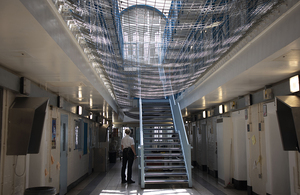New laws to crack down on online prison content
New laws will see harmful content filmed inside prisons removed from social media platforms more quickly – shielding victims from further trauma and protecting prison security.

- new measures to stamp out harmful content illegally filmed in prisons
- social media companies obliged to remove material
- legal loophole closed as part of plan to protect victims, staff and boost prison security
The Prison Media Bill, introduced by Katherine Fletcher MP, will for the first time put beyond doubt the illegality of filming and uploading footage filmed behind bars.
Currently it is not an offence for someone outside a prison to upload a video they have been sent by someone in custody.
The new laws close this loophole and criminalise posting of videos – as well as photographs and audio recordings – regardless of whether the uploader is in custody or not. It will also criminalise unauthorised filming of staff, including by so-called ‘auditors’, or content captured by drones. Those found guilty will face prosecution and an unlimited fine.
Crucially by creating new offences social media companies will now be compelled to remove the illegal content quicker.
Last year 890 pieces of harmful prison content were found online – retraumatising victims, threatening the security of our prisons and the safety of staff.
Edward Argar MP, Minister for Prisons, Parole and Probation, said:
Tackling harmful content filmed behind bars is critical to our plan to protect the public and ensure the safety and security of our prisons.
There is no place for such footage on the internet, and our priority is safeguarding the welfare of victims and our hardworking staff.
Those who upload this illegal content will no longer have anywhere to hide.
Katherine Fletcher, MP, who introduced the Private Members’ Bill that the government is supporting, said:
Crucially, for the first time, this Bill means it will not matter whether the uploading of unauthorised images happened inside or outside the prison – an offence would have been committed either way. The public and particularly victims of crime must have confidence that images of those convicted of offences are not shown to the outside world to be commented on or celebrated.
Importantly, the Bill will also force social media platforms to remove such content as their use would then be for illegal or unlawful purposes and against their terms of service.
Previously content filmed in prisons has remained on social media platforms if it could not be proven that it was uploaded from inside a prison’s walls.
The Bill toughens up existing legislation, namely the Prison Act 1952, by removing the loopholes that criminals have been hiding behind to disseminate illicit and distressing content to the public.
It follows a £100 million investment in prison security, with airport-style scanners stopping illegal mobile phones being smuggled by prisoners internally and new airspace restrictions making it illegal to fly a drone within 400 metres of a prison.